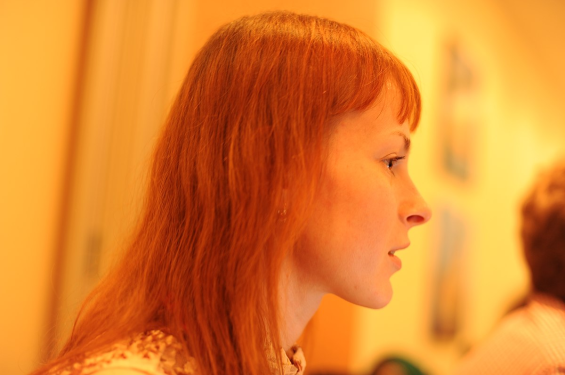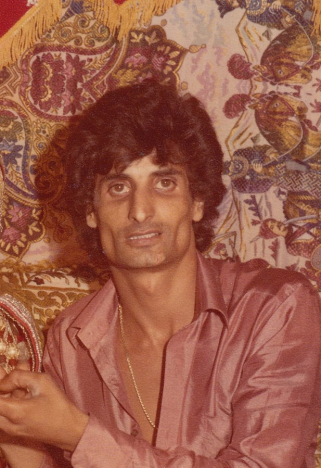Wikimedia Ukraine is collecting and telling stories of Ukrainian Wikimedia community members affected by Russia’s invasion of Ukraine. This article was first published in The Signpost. See the full collection of stories on Meta.
In 2015, Bulgarian Wikipedian Spiritia initiated the #100wikidays challenge. The rules are simple – creating at least one article on Wikipedia every single day for 100 days.
Over the next seven years, the challenge grew in popularity. Over 400 Wikipedia users joined the challenge, and over 100 people successfully finished it. The participants jokingly call themselves “victims” – creating a new article every single day is fun but difficult; you have to sacrifice other tasks or even sleep.
Seven years ago Antanana, an experienced Wikipedian and Ukrainian Wikipedia administrator, became one of #100wikidays’ first participants. In 2022, she decided to complete the challenge again.
Antanana started her 100-days marathon on January 2nd – and almost half of her #100wikidays had to be completed during Russia’s full-scale military invasion of Ukraine. Still, Antanana managed to complete the challenge successfully. In an interview, she shared how she managed to do it, when creating an article was most difficult, and who was inspired by her run to complete the challenge themselves.

Why #100wikidays – and what the articles covered
The decision to start #100wikidays was a sort of New Year’s resolution for Antanana. She says she often “lacked a sense of accomplishment during the day” – the tasks she’d been working on were progressing slowly, and she wanted to see some tangible work completed every day.
She set additional restrictions for herself that are not required by the general rules of the challenge – she covered only Israel-related topics, and each article had to be linked from a different article created in this #100wikidays round.
Antanana chose Israel because she is learning Hebrew – and also because she wanted to visit the country again but hadn’t been able to for a long time because of the COVID-19 travel restrictions. Her first #100wikidays article was about Israeli singer Zohar Argov, while the last one, created on April 11th, covered composer and singer Avihu Medina, who created music for Argov.
During her #100wikidays Antanana wrote, for example, about the Montefiore Windmill, the Sasson Report, and the 1931 census of Palestine. (She also joined other challenges on Ukrainian Wikipedia during her run, and she didn’t count the articles created then as #100wikidays articles).
Antanana mostly translated articles from English and Hebrew editions of Wikipedia. She says writing articles “from scratch”, i.e. not translating from another language, is too difficult when it has to be done every day.
Overall, during her 2022 #100wikidays round Antanana added 685,744 bytes to Ukrainian Wikipedia (one Ukrainian character counts for two bytes).

Contributing every day during the war
Late on February 23rd, Antanana wrote her 53rd article for the challenge. A few hours later, Russian missiles hit her city – and many other cities across Ukraine.
In the early hours of the invasion, Antanana thought about giving up on #100wikidays – but soon decided that she would finish it anyway, and Russian aggression would not force her to abandon her plans.
However, the first days of the Russian invasion were still the most difficult. On February 24, Antanana was in Ivano-Frankivsk, a city in Western Ukraine, but her mother and brother were in a village near Kyiv with Antanana’s grandfather, some 600 kilometers eastward. They had to be evacuated to Western Ukraine. Getting to that village is difficult even in peacetime, and much more so during the war.
A decision was made to immediately get in the car and drive to get Antanana’s family members. The journey was ultimately successful and relatively safe, but long and difficult. They drove for three days – with short breaks for sleep, with large military vehicles on the neighboring lanes, and with long lines at gas stations.
Still, Antanana kept writing a Wikipedia article a day, even in the car (as a passenger) on the way toward Kyiv. She says it was really useful that Wikipedia’s translation tool automatically saves progress – it was helpful when connection was spotty during the drive. These several days were the most difficult in terms of keeping up with #100wikidays, but Antanana managed to do it.
A few days after returning to Ivano-Frankivsk, Antanana went to Israel – and, ironically, finished the challenge of writing articles about Israel in that very country, where she couldn’t get for a few years before.
How to find the time for an article a day
For Antanana, one new article took approximately two hours. That’s enough to translate an average article – not a long and highly detailed one, but something more than a short stub.
Of course, much depends on the topic of a specific article. For Antanana, it also depends on the language which she is translating the article from; she needs more time to translate from Hebrew than from English.
How to find two hours every day? “If you want to, you’ll find a way,” Antanana says. Writing an article on Wikipedia becomes an urgent item on the to-do list. When the task has a specific deadline, you can sacrifice other tasks which can wait for a few more days. And, of course, you can sacrifice the time you’d otherwise spend on reading news, scrolling social media feeds, and even sleeping.
One useful lifehack – plan article topics beforehand. When you’re more busy on a certain day, you can plan to create a shorter article. For Antanana, for example, the quickest to create were articles about Jewish settlements in the Occupied Territories. (In theory, one can also prepare full texts of the articles beforehand. The rules of the challenge prohibit it, but they also encourage ignoring all rules![]() )
)

Consequences of #100wikidays
Antanana’s example inspired a couple of Wikipedian friends to get on a new round of #100wikidays as well.
The first one who couldn’t resist was Spiritia, a Wikipedian from Bulgaria and the challenge’s founder. Many of her 100 Bulgarian-language articles were devoted to Ukraine; for example, she wrote about the theater destroyed by Russian invaders in Mariupol and about prominent Ukrainian painter Maria Prymachenko.
Then, Israeli Wikipedian Ijon joined. He was also among the first #100wikidays participants in 2015. Now, his personal challenge is “consequences of 100wikidays”. The idea is going back to the 100 articles created during the challenge and writing all the articles necessary to turn all the red links blue, i.e. creating all the missing articles linked from the 100 original articles.
Antanana says she doesn’t yet have plans to embark on #100wikidays again – but in the future she might start fixing the “consequences” of her previous two rounds.
Disclaimer: This interview was given in Antanana’s personal capacity as a volunteer editor, not as a Board member of Wikimedia Foundation

Can you help us translate this article?
In order for this article to reach as many people as possible we would like your help. Can you translate this article to get the message out?
Start translation